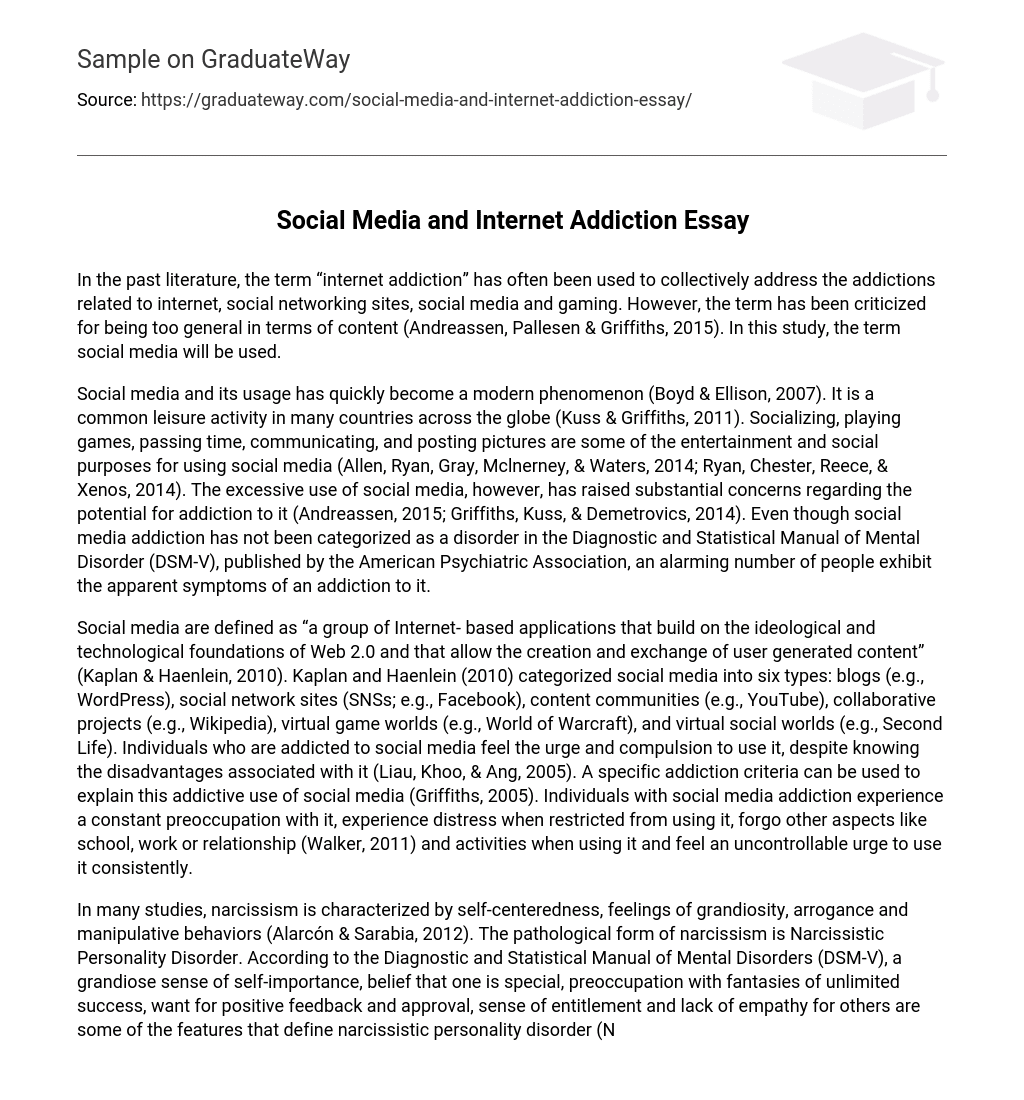In the past literature, the term “internet addiction” has often been used to collectively address the addictions related to internet, social networking sites, social media and gaming. However, the term has been criticized for being too general in terms of content (Andreassen, Pallesen & Griffiths, 2015). In this study, the term social media will be used.
Social media and its usage has quickly become a modern phenomenon (Boyd & Ellison, 2007). It is a common leisure activity in many countries across the globe (Kuss & Griffiths, 2011). Socializing, playing games, passing time, communicating, and posting pictures are some of the entertainment and social purposes for using social media (Allen, Ryan, Gray, Mclnerney, & Waters, 2014; Ryan, Chester, Reece, & Xenos, 2014). The excessive use of social media, however, has raised substantial concerns regarding the potential for addiction to it (Andreassen, 2015; Griffiths, Kuss, & Demetrovics, 2014). Even though social media addiction has not been categorized as a disorder in the Diagnostic and Statistical Manual of Mental Disorder (DSM-V), published by the American Psychiatric Association, an alarming number of people exhibit the apparent symptoms of an addiction to it.
Social media are defined as “a group of Internet- based applications that build on the ideological and technological foundations of Web 2.0 and that allow the creation and exchange of user generated content” (Kaplan & Haenlein, 2010). Kaplan and Haenlein (2010) categorized social media into six types: blogs (e.g., WordPress), social network sites (SNSs; e.g., Facebook), content communities (e.g., YouTube), collaborative projects (e.g., Wikipedia), virtual game worlds (e.g., World of Warcraft), and virtual social worlds (e.g., Second Life). Individuals who are addicted to social media feel the urge and compulsion to use it, despite knowing the disadvantages associated with it (Liau, Khoo, & Ang, 2005). A specific addiction criteria can be used to explain this addictive use of social media (Griffiths, 2005). Individuals with social media addiction experience a constant preoccupation with it, experience distress when restricted from using it, forgo other aspects like school, work or relationship (Walker, 2011) and activities when using it and feel an uncontrollable urge to use it consistently.
In many studies, narcissism is characterized by self-centeredness, feelings of grandiosity, arrogance and manipulative behaviors (Alarcón & Sarabia, 2012). The pathological form of narcissism is Narcissistic Personality Disorder. According to the Diagnostic and Statistical Manual of Mental Disorders (DSM-V), a grandiose sense of self-importance, belief that one is special, preoccupation with fantasies of unlimited success, want for positive feedback and approval, sense of entitlement and lack of empathy for others are some of the features that define narcissistic personality disorder (NPD; American Psychological Association, 2013). The Dynamic Self-Regulatory Processing Model understands the excessive and exhibitionistic behaviors of a narcissist as a result of a motivated self-construction process, which involves frequent misguided attempts to gain attention and sustain self-views of being unique, interesting, and popular (Buffardi & Campbell, 2008; Carlson, Vazire, & Oltmanns, 2011; Panek et al., 2013; Kim, Lee, Sung, & Choi, 2016). Individuals with higher narcissistic traits are prone to have a greater number of friends on social networking sites. They update their pictures and wall posts more frequently and find social networking sites to be more rewarding as compared to individual who are non-narcissistic (Mo & Leung, 2015; Ong et al., 2011; Poon & Leung, 2011). According to a study, there is a positive correlation between narcissism and various social networking activities (La Barbera, La Paglia, & Valsavoia, 2009; Malik & Khan, 2015; Ryan & Xenos, 2011; Wang, Jackson, Zhang, & Su, 2012).
Previous research suggests that an individual’s personality plays a major part in the excessive and addictive use of social media (e.g., Andreassen et al., 2012, 2013; Hong, Huang, Lin, & Chiu, 2014; Wilson, Fornasier, & White, 2010). Prior studies have focused greatly on the problem of aggressive behaviors in students. A study reported that there was a high correlation between aggressive behaviors and internet dependence (Yen et al., 2008). Aggression refers to covert and overt behaviors intended to harm others through an exploitation of relationships (Remillard & Lamb, 2005). Aggression is a behavior that intends to harm another individual directly (Anderson & Huesmann, 2003). As internet today is a mass media interaction tool, adolescents may be lead to behaviors that are hazardous to mental health and society, such as aggression (Ko et al., 2009). It is hypothesized that Internet addicts would encounter more negative life events (Akin & Iskender, 2011; Jun & Choi, 2015) and experience less social support (Csibi & Csibi, 2011; Wang & Wang, 2013; Gunuc & Dogan, 2013) which later easily leads them to aggression.
Research suggests that younger individuals are more prone to scoring higher on the social media addiction scales as compared to older individuals (e.g., Andreassen et al., 2012; Kuss et al., 2014). These online platforms play an important role in the social lives of young individuals (Allen et al., 2014). Social media addiction is becoming a serious concern in University and College students. It affects numerous aspects of study and life of college students (Wang & Li, 2012). As students tend to spend an increasing amount of time online, their academic performance is compromised (Al-Menayes, 2014).





